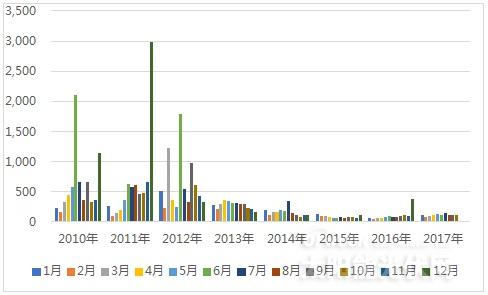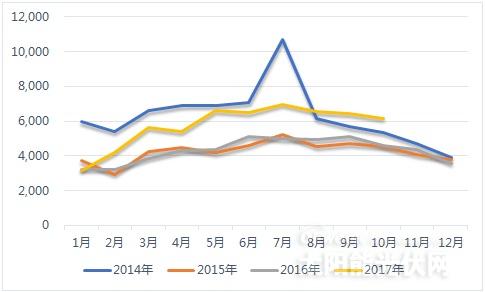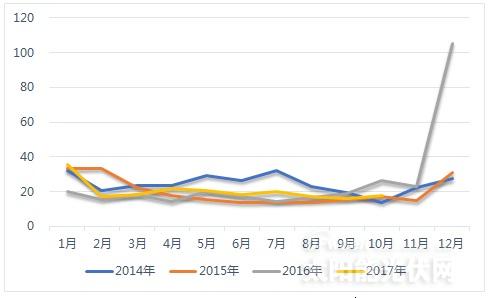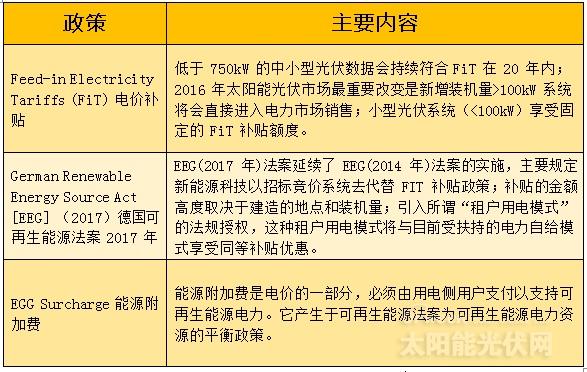Precision Pcb Solder,Solder For Double-Sided,Solder For Electrical Work,14Grams Tube Welding Solder Silver NINGBO XIHAN TIN SOLDER CO.,LTD. , https://www.soldertop.com The data shows that the number of rooftop PV projects in Germany in 2017 was 6,141, a year-on-year increase of 33.65%, mainly due to the smaller installed capacity of rooftop PV projects. The average installed capacity of rooftop PV projects in Germany in October 2017 was 17.82KW. At the same time of the year, 26.51KW became significantly smaller. In addition, from January to October 2017, the German rooftop PV project was relatively stable, and the overall maintenance was between 16-36KW. The details are shown in the following figure: Figure 2: Number of rooftop PV projects in Germany from October 2014 to October 2017 (unit: unit)
The data shows that the number of rooftop PV projects in Germany in 2017 was 6,141, a year-on-year increase of 33.65%, mainly due to the smaller installed capacity of rooftop PV projects. The average installed capacity of rooftop PV projects in Germany in October 2017 was 17.82KW. At the same time of the year, 26.51KW became significantly smaller. In addition, from January to October 2017, the German rooftop PV project was relatively stable, and the overall maintenance was between 16-36KW. The details are shown in the following figure: Figure 2: Number of rooftop PV projects in Germany from October 2014 to October 2017 (unit: unit)  Figure 3: Average installed capacity of rooftop PV projects in Germany from October 2014 to October 2017 (unit: KW)
Figure 3: Average installed capacity of rooftop PV projects in Germany from October 2014 to October 2017 (unit: KW)  Before China became the world's first installed photovoltaic power country, Germany has always occupied the title of the world's largest PV application country. Among them, photovoltaic subsidies played a certain role in boosting, but the high subsidies of photovoltaic power plants made Germany's energy transformation burden heavy, so the EU in recent years The general direction of all countries is to reduce PV subsidies and make them more market-oriented. As a typical representative of the European Union, Germany's grid subsidies have also decreased significantly since 2009. Take the residential roof project with an installed capacity of 30kW as an example. The grid subsidy price has dropped from a historical high of 0.57 Euro/kWh in 2004 to a low of 0.12 Euro/kWh in 2014. In June 2016, through the reform of the Renewable Energy Law, Germany will no longer purchase green power at the government-designated price from 2017, but will issue subsidies through market bidding. The rest of the EU countries: Switzerland, Denmark, Italy and other countries have no plans to reduce or even plan to cancel PV FiT subsidies. The main PV policies of Germany in recent years are as follows:
Before China became the world's first installed photovoltaic power country, Germany has always occupied the title of the world's largest PV application country. Among them, photovoltaic subsidies played a certain role in boosting, but the high subsidies of photovoltaic power plants made Germany's energy transformation burden heavy, so the EU in recent years The general direction of all countries is to reduce PV subsidies and make them more market-oriented. As a typical representative of the European Union, Germany's grid subsidies have also decreased significantly since 2009. Take the residential roof project with an installed capacity of 30kW as an example. The grid subsidy price has dropped from a historical high of 0.57 Euro/kWh in 2004 to a low of 0.12 Euro/kWh in 2014. In June 2016, through the reform of the Renewable Energy Law, Germany will no longer purchase green power at the government-designated price from 2017, but will issue subsidies through market bidding. The rest of the EU countries: Switzerland, Denmark, Italy and other countries have no plans to reduce or even plan to cancel PV FiT subsidies. The main PV policies of Germany in recent years are as follows:  Chart 4: Germany's main PV policy
Chart 4: Germany's main PV policy
Data show that in October 2017, Germany's rooftop PV installed capacity of 109MW, a year-on-year decrease of 10.13%, an increase of 3.46%. From January to October 2017, the German rooftop PV project installed a total of 1130MW, a significant increase from 803MW in the same period last year. The details are shown in the following figure: Figure 1: Installation of rooftop PV projects in Germany from October 2010 to October 2017 (unit: MW, %)